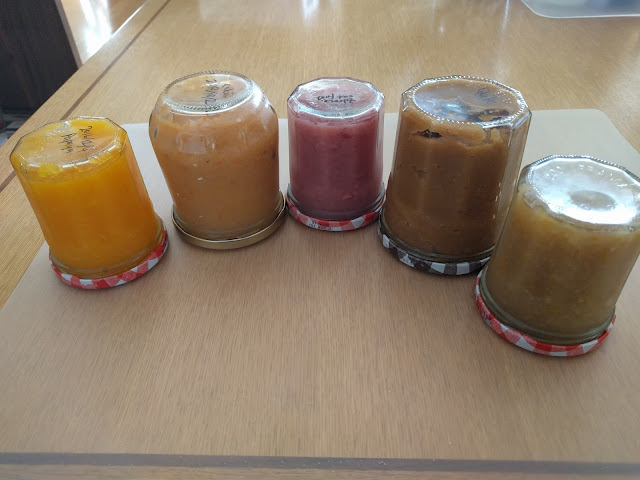Japanese "jam" / spreads
What do you eat for breakfast when living in Japan?
Is it Muesli/Yoghurt/fruits as I do during weekdays or is it bread, butter and jam as I do on the weekend mornings?
Unfortunately, Japanese shops/supermarkets mainly carry strawberry and blue-berry jam. Recently, it seems to have changed, the number of different fruit jams has increased but, unfortunately, the price situation has not improved. 500 Yen for 100g jam is just intolerable, especially, if you consider that half of it is sugar.
There is a very easy solution to this problem. DIY.
 |
| left to right: Papaya, Kaki, Lemon-Pomegrenade, Quince, Grapefruits. Not shown, because already eaten are Apple, Mikan, Kiwi and others. |
I usually buy some price-reduced fruits. Japanese are very picky about the appearance of fruits which, most times, has nothing to do with quality. So supermarkets need to reduce the price to be able to sell it.
How to make?
Clean the fruits well and put them into a cooking pot. In the case of lemon and similar fruits, use a tea strainer to fish out the seeds. But put the pulp back into the pot after separating the seeds. Use a hand-held homogenizer to make a mousse out of the fruits and simply cook to concentrate the mixture. Don't forget to stir well, some of the fruits easily adhere to the pot walls. The fruit "jam"/mousse is ready when the hot mixture drops slowly from a spoon.
Meanwhile you have sterilized your jars and lids by placing them in boiling water for several minutes. Fish them out and dry the outside with a kitchen towel. Not the inside.
Fill about/at least 95% of the jar volume, close the lid VERY well and turn it upside down. Let it cool. The glass is well-closed if the lid is inwards bent. This means the contents are under vacuum.
I recommend storing them in a fridge. Eat as soon as possible but I think you can keep them for a year without problems.
Banana mousse is also possible but it is very foamy.
Now, you have made very tasty, healthy (no sugar) fruit spreads. My favourites are Kiwi and Quince.
The meaning of "Japanese" means that you can buy these fruits easily in Japan. These spreads are not Japanese-style, however.



Comments
Post a Comment